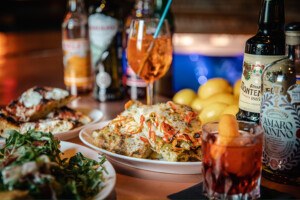Restaurant Review: Bronwyn in Somerville

Photograph by Justin Hamel
Bronwyn is the restaurant Tim Wiechmann was born to open, the one he’s been training his entire life to invent. It celebrates Germanic cooking, a broad swath of cuisine I happen to admire and often love, and have spent years seeking out. That’s partly because I had a Hungarian grandmother and plenty of Eastern Europe in my background. And it’s partly because the best breads are German, and I’ll go anyplace for German rye and pretzels.
The restaurant explores a new and far more adventurous range than what my—or probably most anyone’s—grandmother made, like blutnudeln, homemade pasta moistened with blood instead of water. Many of these dishes did come from Wiechmann’s own grandmother, however. He grew up between Switzerland and Marblehead, with relatives who hailed from northern Germany, and used the opening of his second restaurant as a way to “try to figure out where I came from.” T. W. Food, his first, was ahead of the farm-to-table curve, though he surprised anyone expecting something rustic from all the farm names on the menu with polished technique and a French-Italian vocabulary. The new restaurant (named for his wife, whose family is actually Pennsylvania Dutch) is smack in the heart of Union Square next to the newish and good Casa B. Its defining concept is beer garden, with big, heavy, dark wooden tables—both inside and, in good weather, out—that are designed for sharing the ambitious menu of imported German and German-style beers. The space also features carved scrollwork chairs that could double as thrones in a high school play, as well as pussy-willow wreaths and appliquéd suede lederhosen on the walls. There’s nothing light about the look—and there’s very little light about the food.
To love real German food, you’ve got to love potatoes and cabbage, two of the five foundations Wiechmann says he built the menu on. And onions, often used for the intrinsically German combination of sweet and sour, with an emphasis here on the sweet. The other two foundations are wheat, used in salty, hot-out-of-the-oven handmade pretzels ($7) with gleaming skin that crackles as you break off a baton, and, especially, pork: not just the usual pork belly and bacon but pork blood and lard, which turns up in—wait for it—the schmaltz. In non-Yiddish-speaking Germany and Eastern Europe, “schmaltz” doesn’t mean chicken fat; it means pork fat. At Bronwyn, it’s an unholy combination of the two.
A startlingly wide offering of house-made wursts forms the centerpiece of the menu, along with a long list of very substantial “starters” and eight or nine noodle dishes and mains. Even if much of the menu is modeled on bar and street foods, Wiechmann’s takes on wursts, offered in $12 and $26 tasting platters, came off much more refined and idiosyncratic. Take currywurst, a street-food emblem of Berlin. It’s usually gritty, grainy, sauced, and memorably spicy (as in, you involuntarily remember it hours later). Here, like other dishes described as spicy on the menu, the curry was mild. Wiechmann adds milk and eggs to the meat mixture and grills the sausage, giving it a crisp, blackened skin that provided a great contrast with the soft, rich interior. It was nothing like the steamed, smothered, hot-dog-like currywurst I remember from blindingly lit night kiosks.
Wiechmann’s kielbasa won’t be familiar to anyone used to long links. A round, thick slice of very moist all-pork meat loaf, it arrived soft and glistening white, thanks to gentle poaching in cream. “A completely original Tim recipe,” Wiechmann says, explaining that because “kielbasa” is simply a generic Slavic word for “sausage,” he can do to it whatever he likes. His was luxurious and very good—and nothing like the garlicky, gristly sausage you’d expect.
The starters, though less challenging, were just as unique. Pierogi ($11), for instance, were far from the doughy, potato-filled crescents Poles take pride in. Wiechmann’s oversize seared half moons, by contrast, had a crisp, flaky dough that made them seem like tarts fresh out of the oven, filled with a small amount of winter squash and apple, plus plenty of onion. This was perfect bar food. Knödel ($11), a savory bread dumpling made of slices of unusually sweet oat-honey challah, was deeply flavored with sweet, long-cooked onions, rolled into a log, poached, cut, and sautéed in butter.
The schmaltz ($7) was a bridge too far, blending not only pork and chicken fats but also chicken-skin cracklings, the entire thing topped with a big, puffed pork-skin crackling. Culture clash! No matter how much you love lard and chicken-fat schmaltz, neither benefits from the combination. A safer spread: obatzda ($7), the mild, appetite-whetting paprika-spiked soft-cheese mixture every Bavarian housewife has up her sleeve.
Wiechmann’s knack for invention shined more convincingly in his reimagination of potato pancakes as reibekuchen ($9), bound with crème fraîche, fried to order in oil and butter, (barely) seasoned with curry powder, and served with sweet-and-sour shallots. They were crisp, sweet, and irresistible, and—like the knödel and even the pierogi—can be either an appetizer or a savory dessert. Bacon-studded German potato salad ($5) was the only non-sweet potato dish, getting its savoriness not from the usual vinegar but from mustard. With luck, yours won’t be served straight out of the refrigerator.
As for the knish ($10), along with a little potato, there was a nontraditional dry filling of shiitake mushrooms, onions, hazelnuts, and blue cheese, all baked within a brittle, tough crust—another Wiechmann experiment that fell flat. And where was that pork blood, again? In place of water in the blutnudeln ($21) dough, as well as in the sauce that coated this sanguine spin on fat spaghetti, its sweetness pointed up with pork shoulder and butternut squash. Once you get used to the sweet salinity of blood, you have to get used to the stickiness of blood in a sauce. At that point, you’ll find a subtle dish that uses the best flavor components of blood, rather than hiding its mineral meatiness with spices (as in blood sausage and blood pudding).
In keeping with the beer-hall idea, the emphasis is far greater on snackable starters and wursts than on the mains. Best was the jägerschnitzel ($24), a classic variation on Wiener schnitzel that came topped with mushrooms. Again, it was an unconventional preparation, thick instead of pounded paper-thin like schnitzel typically is, and topped with honey and walnuts along with the mushrooms, because, well, Wiechmann likes the combination. The breading was crisp, dark, and greaseless, the meat (sometimes veal, sometimes pork) tender. It was thick but very good, too, and there was lots of it.
You might wonder about salads or lighter items. Well, this is German food—keep wondering. Okay, there’s the classic cucumber-onion-sugar-vinegar salad and Riesling-steeped sauerkraut (both $5), but the portions were tiny, and given the heavy salting and soggy texture, they were not especially refreshing.
As for dessert—the German-Viennese tradition boasts a huge wealth of cakes and tortes, of course, and I hope that Wiechmann will explore those riches further with his expert and experienced baker, Keiko Tanaka, who also makes the notable breads. But for now, there’s one traditional, unaltered, unmissable Viennese dessert: kaiserschmarrn ($8). It’s a very easy dessert: You fill a pan with pancake batter as though you were making one giant pancake, wait for the batter to brown on one side, then start breaking it into shreds, which you move around the pan with a spatula as though scrambling eggs. It was delicious—a ticket back to everyone’s childhood, German or not. Much of the menu at Bronwyn is a little odd, and, yes, a little challenging—but it’s jolly, and fun, and the cheer will have you trying anything they suggest after a beer or two.
MENU HIGHLIGHTS
Pretzel, $7
Giant Wurst Platter, $26
Pierogi, $11
Jägerschnitzel, $24
Kaiserschmarrn, $8
Bronwyn, 255 Washington St., Somerville, 617-776-9900, bronwynrestaurant.com.
Critic Corby Kummer—an editor at the Atlantic and author of The Pleasures of Slow Food—has been reviewing Greater Boston’s top restaurants in our pages since 1997.


